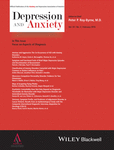STRESSORS, SYMPTOM PROFILE, AND PREDICTORS OF ADJUSTMENT DISORDER IN CANCER PATIENTS. RESULTS FROM AN EPIDEMIOLOGICAL STUDY WITH THE COMPOSITE INTERNATIONAL DIAGNOSTIC INTERVIEW, ADAPTATION FOR ONCOLOGY (CIDI-O)
The authors declare that there are no conflicts of interest or financial disclosures related to this work.
Contract grant sponsor: Deutsche Krebshilfe (DKH); contract grant number: 107465.
Abstract
Background
We aimed to investigate type and frequency of stressors, predominant symptom profiles, and predictors of adjustment disorders (AD) in cancer patients across major tumor entities.
Methods
In this epidemiological study, we examined 2,141 cancer patients out of 4,020 screened with the Composite International Diagnostic Interview, adaptation for oncology (CIDI-O). AD were operationalized as subthreshold disorders according to DSM-IV criteria.
Results
In our sample, 265 out of 2,141 patients (12.4%) met all criteria for AD (unweighted 4-week prevalence). The disclosure of the cancer diagnosis, relapse or metastases, and cancer treatments were most frequently described as stressors associated with depressive or anxious symptoms. With regard to AD symptom profiles, patients showed high prevalence rates of affective symptoms according to the DSM-IV criteria of Major Depression: The highest prevalence rates were found for cognitive disturbances (concentration and memory problems) (88%), sleeping disturbances (86%), and depressive mood (83%). We found sex, education, and metastasis as significant predictors for AD. Higher education was the most influential predictor. Men were half as likely to report symptoms fulfilling the AD criteria as women. Patients with metastasized tumors had a more than 80% higher risk of AD than those without metastasis. However, the explained variance of our model is very small (Nagelkerke's R² = 0.08).
Conclusions
Patients with AD can be identified using a standardized instrument and deserve clinical attention, as they often show severe clinical symptoms and impairments. Improving the clinical conceptualization of AD by the adding-on of potential stress-response-symptoms is necessary to identify severe psychological strain.




